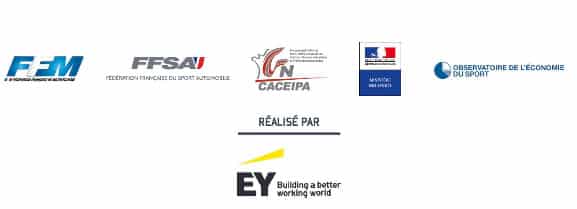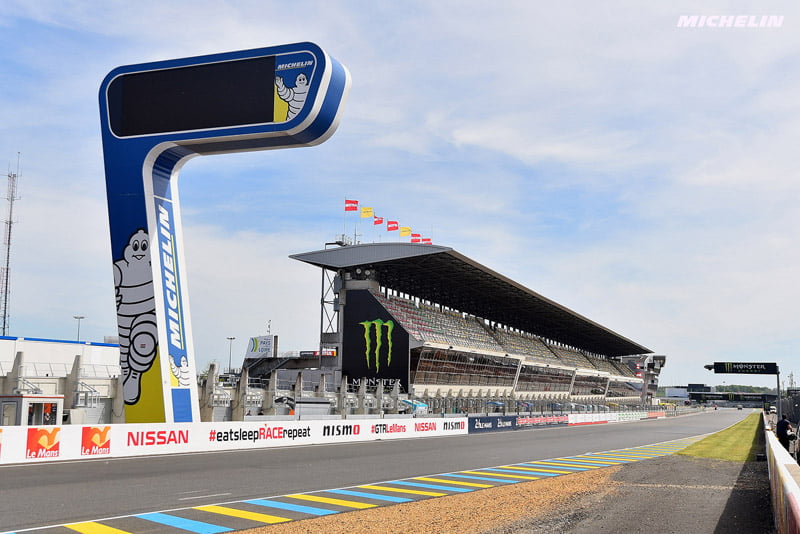The Minister of Sports, Roxana MARACINEANU, the President of the French Motorcycling Federation, Jacques BOLLE, the President of the French Motor Sport Federation, Nicolas DESCHAUX and the President of the National Group of Automobile Circuits and Industrial Test Centers, Jean -Pierre MOUGIN, organized Tuesday November 26, 2019, in the premises of the Automobile Club de France (Paris), the presentation of the 1er Economic barometer of motor sports produced by EY.
This study, carried out within the framework of the Sports Economy Observatory of the Ministry responsible for sports, is part of the process of structuring the sports economy sector driven by the State since 2015 to better promote economic players in sport in their actions and strengthen their competitiveness on the international level.
A major economic and sporting sector in France
With a turnover of 2,3 billion euros, motor sports constitute a major sporting and leisure sector in France, halfway between the 7,5 billion generated by professional football and the 1,5. XNUMX billion turnover generated by the golf industry.
Motor sports also generate numerous jobs on French territory, estimated at 13 people in 500, a number comparable to that of the golf industry.
Thanks to its activity, the motor sports ecosystem displays an added value estimated at 510 million euros.
Manufacturers represent 39% of the overall turnover of motor sports and more than half of the jobs in the sector (7).
Finally, the sector contributes to public finances. The amount of tax and social contributions paid by its actors is estimated at 233 million euros, similar to that of festivals and musical shows (266 million euros).
A sector anchored in the life of the French and the territories
Each year, 1 clubs and associations spread across France organize around 600 events in each of the 2 motor sports disciplines which bring together a total of 300 licensees. Around 47 people participate each year in the organization of these events throughout the territory.
Circuits and practice locations represent 28% of the sector's turnover. The region has more than a thousand practice locations for a total number of 2 jobs. They contribute to the international influence of France thanks in particular to the major competitions and world reputations which take place there (800 Hours of Le Mans, French F24 and Motorcycle Grand Prix, Enduropale du Touquet Pas-de-Calais, Rallye de France WRC, WRX Lohéac…). In total, 1 million people attend these major events each year.
A sector focused on excellence and the future
Innovation remains one of the major markers of the sector, motor sports having always been part of major transitions. Full-scale laboratory for manufacturers to experiment and develop the industry's responses to ecological, digital and mobility issues. Symbols of this transformation: the Formula E World Championship, the hybridization of F1 or the WRC, the new WEC (24 Hours of Le Mans) regulations with electrification as well as the launch in 2019 of the FIM World Cup MotoE and the FIM Trial-E Cup.
Tourism linked to motor sports has strong growth potential. For example, the tourism benefits of the 2018 French F1 Grand Prix were estimated at €46 million.
The structuring of the “motor sports collective”
This study shows that motorsport players occupy a particular place in the economic sector of sport. They are historically and naturally closely linked to the industrial sector from which they come. As an extension of this study and according to the Minister's roadmap, the heads of networks in this sector aim to continue structuring their sector through the creation of a "motor sports collective" which will be integrated into the Sports Sector.
Mrs. Roxana MARACINEANU, Minister of Sports: “ I am pleased that the Ministry of Sports is supporting the motor sports sector in defining the economic impact of a sector with exceptional dynamism and territorial coverage. I trust this sector of excellence whose DNA is innovation to meet a double challenge: that of the environmental emergency and that of the safety of practitioners and spectators. »
Mr Jacques BOLLE, President of the French Motorcycling Federation: « This economic barometer of motor sports is a first and constitutes a fundamental and determining element allowing us to value and promote our activities; rich in their diversity and armed to face new challenges. »
Mr. Nicolas DESCHAUX, President of the French Motor Sport Federation: « As President of the FFSA, I wish to continue to act for the players who make up our sector by supporting their dynamism while fully responding to the economic, societal and environmental challenges that are ours. »
Mr. Jean-Pierre MOUGIN, President of the National Group of Automobile Circuits and Industrial Test Centers: “ The GN CACEIPA, which brings together almost all of the French car and motorcycle circuits as well as industrial test centers, was heavily involved in this study which highlights the importance of the motor sports sector in France, both through of the jobs it generates, as well as by its economic and fiscal benefits and by the number of associations and volunteers who run it throughout the territory. »
Mr Marc LHERMITTE, Partner at EY: « This 1er barometer tells of a surprising economy, beyond the major sporting events which symbolize it, through the incredible variety of practices and their industrial and technological reality. Powerfully relayed by the media and social networks, motor sports also have a very local anchor, around the 2 events that span the territory, with their multiple economic, tourist and fiscal benefits. »
CLICK HERE TO DOWNLOAD THE FULL REPORT OF THE FIRST ECONOMIC BAROMETER OF MOTOR SPORTS
CLICK HERE TO DOWNLOAD THE SUMMARY OF THE FIRST ECONOMIC BAROMETER OF MOTOR SPORTS


























